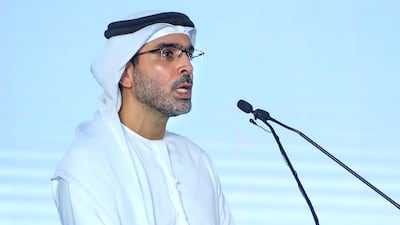The UAE is taking a “pragmatic” approach to its energy transition while being “well positioned” to become a leader in the global hydrogen sector, a Ministry of Energy and Infrastructure official has said.
Sharif Al Olama, the ministry's undersecretary for energy and petroleum affairs, told the RAK Energy Summit on Tuesday that the approach was part of a plan to “hold back emissions, but not development”.
“We started work on our National Hydrogen Strategy [and] we plan to build on the promising and competitive advantages the UAE has,” he said.
The National Hydrogen Strategy will help establish the UAE's vision pertaining to clean fuel and guide its policy decisions amid a push to achieve its net zero targets by 2050.
It is part of the country's Hydrogen Roadmap and its continued commitment to decarbonisation and the energy transition.
The 28th session of the Conference of the Parties, or Cop28, as it is formally known, will be held in UAE in 2023.
The meeting, which will follow on from Cop27 in Egypt this November, will try to find solutions to the threats posed by climate change.
“The rapidly changing energy landscape over the past few years [has] shown us that we must ensure that we transition into a future that meets growing energy demands … [and] offers affordable, reliable, accessible and sustainable energy systems,” Mr Al Olama said.
Oil prices have been highly volatile over the past few years, mostly due to supply constraints, geopolitical tension and the Covid-19 pandemic.
Having touched a 17-year low in April 2020, prices rose steeply to nearly $140 a barrel after the Russia-Ukraine conflict began in February.
However, Mr Al Olama does not see a “one-size-fits-all” solution to global energy transition efforts.
“The pace of energy transition will vary across the globe depending on the … policy, technology, investment trends and region,” he said, adding that the world “will see a diverse set of low carbon energy sources”.
Meanwhile, oil and gas are expected to continue to play a major role in meeting rising energy demand worldwide.
In a separate panel discussion, Yousif Al Ali, the ministry's assistant undersecretary for water, electricity and future energy affairs, highlighted the need for “long-term investment plans, when it comes to oil and gas”, to sustain or raise production.
Global oil and gas investments will increase by more than 4.3 per cent annually to $628 billion this year as the industry recovers from the coronavirus pandemic, according to a report by consultancy Rystad Energy.

